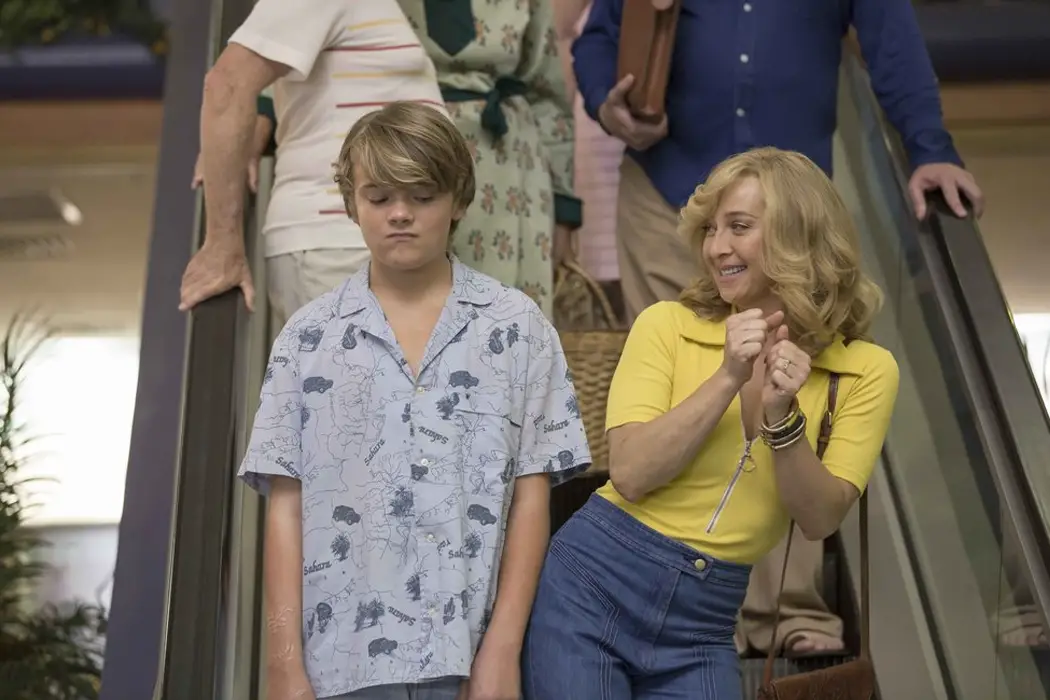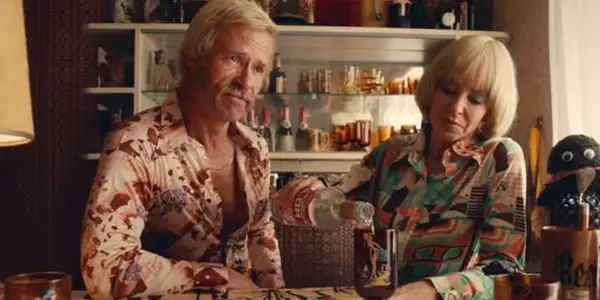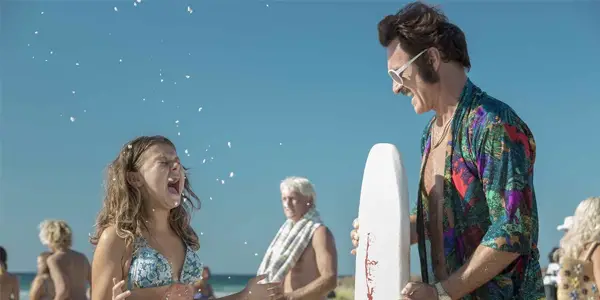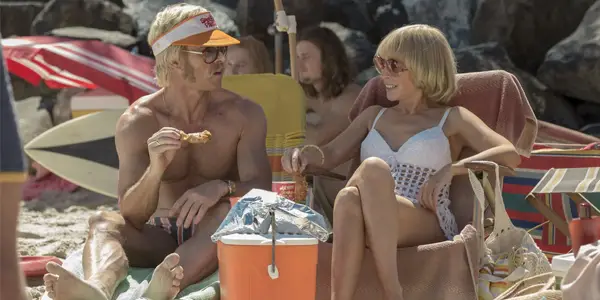SWINGING SAFARI: Australia’s First 2018 Movie Misfire

Alex is a 28 year-old West Australian who has a…
We’re only two weeks into 2018 and I’m confident enough to label Swinging Safari one of the worst films of the year. From Australian writer-director Stephan Elliott (whose most notable credit is directing The Adventures of Priscilla Queen of the Desert, a credit that is still being honoured 24 years later), Swinging Safari is a complete cinematic mess of narrative incoherence and nostalgic pandering.
People may criticise the Netflix series Stranger Things for its obvious emphasis on its 80’s foundational references, but at least the Duffer Brothers expanded upon them, building characters and other plot nuances from the Stephen King and Spielberg tales that inspired the series.
Instead of doing anything interesting with its mid-1970’s Australian setting, Elliott is happy to use it as a platform to parade a series of historic reminders, stopping the story every five minutes to simply point to an outdated product and state “Hey, remember this?”, to absolutely zero plot or thematic meaning. By the time that the film literally paused itself to make a Betamax joke, I had become infuriated.
The Plot I Was Promised
It’s unfortunate, because Swinging Safari (originally titled Flammable Children) starts off quite promising, kicking off with a stylish opening that efficiently introduces us to the central three families that live on the same cul-de-sac in suburban Australia. We first meet the Hall Family, the poorest of the trio, led by precarious encyclopaedia salesman (Guy Pearce) and an incredibly wasted (in both literal ways) Kylie Minogue.
Across the road from them are the Marsh Family, with a terrifically side-burned Bob (Jeremy Sims) and stressed out Gale (Asher Keddie). The last, and most well-off, are the Jones Family, the drug selling (and dependent) patriarchs to a collection of tacky imported goods (Radha Mitchell and Julian McMahon).
The plot setup is pretty simple too – these families, seemingly life-long friends, decide to shake things up during the sexual revolution by experimenting with the art of swinging. As the parents partake in a key-swapping party, the diversely aged dysfunctional kids are up to no good, led by our (somewhat) protagonist Jeff Hall, a budding filmmaker who’s in the middle of making his own 8mm action film series titled “Deathcheaters”, titled after Brian Trenchard-Smith’s breakout hit of the same name.

Because this story setup apparently wasn’t enough, the local beach where the three friendly families spend their hot summer weekends together is disrupted by the arrival of a gigantic beached whale, whose only function seems to be is to act as a seismic metaphor that Melly (Darcey Wilson), the depressed daughter of the Jones family, repeatedly spells out for us. Melly is a miserable character whose repeated appearances continuously sucks out all of the energy that the well-intentioned nostalgia gags inspire.
I don’t want to criticise the performance of Darcey Wilson, but her character seems to exist in such an oppositional tone to the rest of the film (issues about depression and childhood anxiety really shatter the vermeer of youthful innocence that Elliot tries to conjure) that the goofy tone is frequently shifted in directions that actively hurt the good time that is trying to be given to the audience.
Just cutting her meandering subplot wouldn’t help straighten the disjointed jumble that is the central plot though, it’s that Elliot evidently had no idea what story he wanted to tell. Was it about the parents swinging and the dark aftermath of partaking in the activity? Is it about living as a child in the 1970s? Is it about the claustrophobic nature of suburban lifestyles? Is it about the arbitrary appearances of blue whales on Australian beaches? Who knows, but this film is going to try and tackle all of them, in absolutely any order it seems fit.
Bad Script VS Poor Editing
Due to the way films are constructed, it is sometimes hard to decipher between what elements of the final product come from its original script, and what happened when that footage was eventually edited. To say Swinging Safari is poorly edited is an understatement, it makes the cinematic stir-fry Suicide Squad look like a Jill Billc*ck constructed masterpiece. After the initial characters and general premise is setup, all sense of plot momentum and time/spacial awareness completely fly out of the window.
Characters and plots come and go as they please, no actions/unfolding developments ever seem to have any form of consequence, causing it to fall into a rambling mess that you’d expect to hear out of the mouth of the pants-less man on the train. Seriously, I cannot emphasise enough just how incoherent the plot is, it’s so confusingly tangled that I’m sure Jean-Luc Goddard will praise it for its avant-garde ideals, reviewed via a sticky-taped note on a glass door.

The script does attempt to have some fun setup and payoffs, but having characters outwardly state bits like “One day that dog is going to blow up” can only lead you to patiently wait for the cruel payoff to occur, one which only causes more confusion than laughs. In the current age of “doggo” culture, why would you think that multiple blunt jokes about dogs being killed would be appreciated by anyone? This is where a sense of subversion would have been appreciated, instead of going for the easy gag every time.
Another example includes Asher Keddie’s repeated threats of peeing on her daughter for being stung by jellyfish ends with the gross gag being completed, slightly off-screen. So what? What’s the joke here? If we’re going to quickly deconstruct this joke, you have this action threatened multiple times, thus the audience expects that it’s going to happen at some point, otherwise the script wouldn’t emphasise it so much.
Then, at some arbitrary point in the movie (during a brief montage that seems to burn off a bunch of deleted scenes), Keddie does it, unseen, and the reactions from the other characters are cut immediately. So, if this is supposed to be a prime joke, at what point am I meant to laugh at? The act, the reaction or the payoff? Because none of them subvert, surprise or shock you, so what is meant to be funny here? This is just a microcosm for all the jokes in the movie, when it’s not leaning on its finger-pointing at beloved supermarket items of old.
Weaponised Nostalgia
Nostalgia is currently one of the key cinematic weapons frequently used by Hollywood in order to sell tickets, seen in the success of multiple franchise reboots, remakes and superhero movies, as the mixture of an ageing and geek-friendly audience start to digest the symbols of their fading childhood, interacting with art that features pop culture references that they are already familiar with.
The middle-class setting of Swinging Safari makes its nostalgic approach known almost immediately, servicing the audience with a barrage of visual and audio tokens of 1970’s Australia, so specific that anyone foreign to these former artifacts will be left with a feeling of tedium, as the movie never rests to remind you that in fact, this film is set in the mid 1970’s.

Outside of the obvious reminders, the period-appropriate aesthetic already sells the sun-soaked era of emerging sexuality purely through its warm colour palette, grainy cinematography and dedicated production design. Just through these elements, I’m already sold on the time setting, I don’t need a constant reminder of it.
It grows to become incredibly obnoxious quite fast, with every character frequently delivering ham-fisted conversations about obvious trademarks and tokens of the 1970’s, these persistent dialogue prompts would’ve been acceptable if anything outside of being cultural touchstones were done with them. Much like how Asher Keddie’s character peed on her daughters face, director and writer Stephan Elliot inundates us with a stream of unwanted material, as I close my eyes and scream as a barrage of Number 96 references head my way.
Conclusion: Swinging Safari
Swinging Safari, Australia’s first major movie release of 2018, starts off the year on a real unforunate flat note. An established cast, a talented technical crew who’ve clearly done alot of work and a decent budget have formed together to create a potential comedy classic that’s completely dismantled over the flaw of being fundamentally incomprehensible.
It’s like filling out a Sudoku puzzle with crossword answers, all the pieces are put in the wrong boxes. A solid comedic premise is muddled with the need to elevate the material with unnecessary thematic depth and quirky visual metaphors, all misguided steps that quickly unwind the potential that the on-paper details promised.
Director and Writer Stephan Elliot’s eclectic script is much more interested in acting as a catalogue of missed symbols from his 1970’s youth, supported by a dense amount of flat, predictable jokes that give the same reaction as the dated punchlines found within Christmas crackers. Every setup and potential gag is so heavily signalled, that I knew all of the upcoming punchlines for the same reason I know that a golfer brings two pairs of pants to the golf course in case he gets a hole in one.
Some might think it’s hyperbolic to state that Swinging Safari is easily one of the worst films of 2018 so far, seeing as we’re only two weeks in, but if there’s any more movies to emerge within the next 345 days with this utter lack of basic narrative structure, then may god have mercy upon my cinema-watching soul.
What are some of your favourite Australian comedies? Tell us your thoughts in the comments below!
Swinging Safari was released in Australia on January 18, 2018, with no current plans to release in the US or UK. For all international release dates, see here.
Does content like this matter to you?
Become a Member and support film journalism. Unlock access to all of Film Inquiry`s great articles. Join a community of like-minded readers who are passionate about cinema - get access to our private members Network, give back to independent filmmakers, and more.













